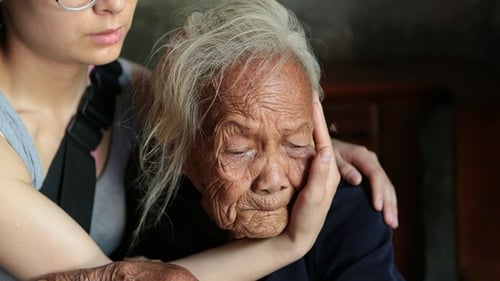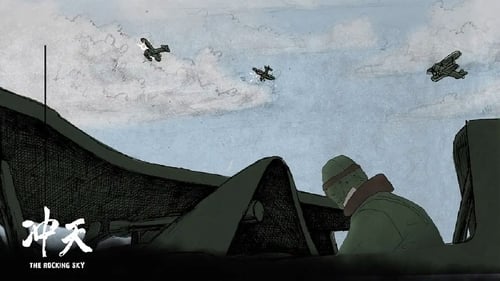Taking Father Home (2005)
Genre : Drama
Runtime : 1H 40M
Director : Ying Liang
Synopsis
A 17 year old boy from a village in the Sechuan province leaves for the big city looking for his father, who left 6 years before and has not been heard of since. The fact that his mother still receives money his father does nothing to tame his anger. He his not looking for a warm reunion, it is unconcealed revenge that drives him. Totally lost, he roams the big city with his basket of ducks on his back...

A soon-to-be first-time voter, the filmmaker’s thought-provoking journey into the Rust Belt and South captures four Asian American voters’ ardent first time grassroots political participation ignited by the 2016 rise of “Chinese Americans for Trump.” FIRST VOTE is a character driven cinema verité style film chronicling the democratic participation of four Asian American voters from 2016 through the 2018 midterm elections.

A documentary chronicling the coming of age of a young chinese man.

Follow the lives of the elderly survivors who were forced into sex slavery as “Comfort Women” by the Japanese during World War II. At the time of filming, only 22 of these women were still alive to tell their story. Through their own personal histories and perspectives, they tell a tale that should never be forgotten to generations unaware of the brutalization that occurred.

The movie follows two unfortunate secret lovers who are constantly looking for a solution to their situation. Both of them are always arguing over their relationship. One day they went to a trip out of the city, into the outskirt. They hope they can solve their problems or at least escape them temporarily. They don’t have a solution, and they don’t understand why they are together. One thing that keeps them together is their love and care for each other. This is the second part of James Lee’s Love Trilogy which takes another look at unfaithfulness or rather faithlessness.

The mother of a murderer awaits and prepares to meet her son. The true story of a man who killed six Shanghai policemen after suffering police beatings as a punishment for riding an unlicensed bicycle. This film was produced as a part of the Jeonju Digital Project.

A 17 year old boy from a village in the Sechuan province leaves for the big city looking for his father, who left 6 years before and has not been heard of since. The fact that his mother still receives money his father does nothing to tame his anger. He his not looking for a warm reunion, it is unconcealed revenge that drives him. Totally lost, he roams the big city with his basket of ducks on his back...

"If the old doesn't go, the new never comes" recites a teenager hanging out near a demolition site in the center of Chengdu, the Sichuan capital in western China. In Demolition, filmmaker J.P. Sniadecki deconstructs the transforming cityscape by befriending the migrant laborers on the site and documenting the honest, often unobserved, human interactions, yielding a wonderfully patient and revealing portrait of work and life in the shadow of progress and economic development.

Filmed over three years on China’s railways, The Iron Ministry traces the vast interiors of a country on the move: flesh and metal, clangs and squeals, light and dark, and language and gesture. Scores of rail journeys come together into one, capturing the thrills and anxieties of social and technological transformation. The Iron Ministry immerses audiences in fleeting relationships and uneasy encounters between humans and machines on what will soon be the world’s largest railway network.

The film is director Gao Zipeng’s first fiction film which takes three years to complete. It premieres on March 27, 2001 in UCCA and stars the poet A Jian, Xiao Zhao and the writer Gou Zi. The film is based on a true crime of disappearance. It creates an atmosphere of what Ma Zhiyuan, a celebrated poet and playwright of Yuan Dynasty, portrays in his famous poem “Autumn Thoughts”: Over old trees wreathed with rotten vines fly evening crows/ Under a small bridge near a cottage a stream flows/ On ancient road in the west wind a lean horse goes/ Westward declines the sun/ Far, far from home is the heartbroken one.

Gentle, easy-going Or Kia moves from the countryside to Kuala Lumpur to work for his cousin and best friend Ah Soon, a mid-level gangster and enforcer. While Or Kia works hard to put a sister through school, Ah Soon cares for an unstable girlfriend prone to mysterious disappearances. As they both sink deeper into a nocturnal world of debts, drugs, and betrayal, Or Kia's loyalties are strained when Ah Soon falls out of favor with the bosses and tries to escape the business.

Danni, a young Chinese girl, comes home to pay her respect to her late grandfather. Out of place in the traditional Muslim environment, she unearths a hidden secret of her past and thus embarks on a journey, against her parents’wishes, in the suppressed but mesmerising world of Islamic culture in modern China.

A highway is waiting to go through a quiet village in Hunan, a province in central China where Mao was from. Due to the high cost of construction, construction companies and migrant workers who live on road work rush to here like the tide. In the following four years, they root in this strange place for interests, paying sweat and blood, even their lives. With their arrival, local village and peasants are forced to change their lives. Many hidden interest lines and hidden rules about road construction of the nation are unveiled, together with the shocking truth and emerging secrets.

A Yangtze Landscape utilizes a non-narrative style, setting off from the Yangtze's marine port Shanghai, filming all the way to the Yangtze River's source, Qinghai/Tibet - filming a total distance of thousands of kilometers. Experimental music and noise recorded live on scene are used in post-production, painstakingly paired with relatively independent visuals, creating a magically realistic atmosphere contrasted with people seeming to be 'decorative figures' right out of traditional Chinese landscape scrolls.

Xuan is a young man working in the film industry in Beijing. To make a documentary film that he wants to present at international festivals, he decides to take advantage of the holidays of the Day of the Dead to return to Chengdu, his hometown located at the other end of the country. The documentary he is about to make is about his relationship with his own lover. He leaves for Chengdu, accompanied by another man, Bo, the cameraman of the film. The two men take the train to Chengdu where Hong, Xuan's lover, is waiting for them. From the first moment of their arrival at the station, Xuan and Bo begin to turn with their camera, Xuan having already explained to Bo what he wanted to film and that Hong would always be "playing", Bo then trusting in Xuan. But Hong is more and more opposed to this camera and the presence of Bo.

To commemorate the 70th anniversary of the victory of WWII, this documentary film describes the eight years of dauntless air-force fighting of the republic of China during the Anti-Japanese War, with only 300 combat-capable aircraft from China while Japan had over 2000.

Six life stories of German, Austrian and Russian Jews which intersect in exile in Shanghai.

Coming back to her broken family, pregnant writer Huang Xiaoyu and her French husband, Benjamin, finds herself trapped between her cult brainwashed mother, Li Jiumei, and her secretly homosexual father, Huang Tao.

If It’s Not Now, Then When? mostly takes place in an apartment inhabited by three members of a family (though never at the same time): mother Pearlly Chua (from Tsai Ming-liang’s I Don’t Want to Sleep Alone), daughter Tan Bee Hung and young son Kenny Gan. Their father seems recently to have died. The mother leaves early and returns late, out on long walks in the park with a lover whom the daughter and her best friend try to spy on. The daughter pecks away at a computer at work and has a desultory affair with her married boss, which he carries on between his business and family phone calls. And the son breaks into cars and “recycles” the electronics he finds.

Yu Guangyi's stunning debut explores a grueling winter amongst loggers in Northeast China as they employ traditional practices through one last, fateful expedition. For generations, the lumberjacks of Heilongjiang, China have made their living harvesting timber amidst a barren, wintry landscape. These woodcutters confront the elements, living in makeshift cabins surrounded by snow and ice. Hand tools, sleds and horses are the only technology they employ to drag massive trees down the perilous slopes of Black Bear Valley. At constant risk of injury and death, they attempt to appease the mountain gods with ancient rituals and sacrifices. Despite their heroic efforts to subsist, the deforestation caused by their decades-long customs may lead to their ultimate demise.










